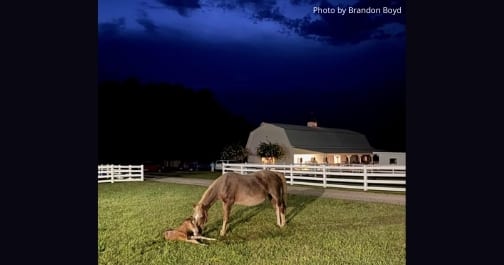-information courtesy of N.C. Department of Agriculture and Consumer Sciences
A total of 17 horses in nine counties across the state have had to be euthanized in the past few months to help prevent spread of equine infectious anemia. Wake County is the closest county to Vance and Granville where an infected horse has been located, according to information from the N.C. Department of Agriculture and Consumer Sciences.
In addition to Wake County, infected horses have been found in Duplin, Forsyth, Henderson, Mecklenburg, Randolph, Sampson, Surry and Yadkin counties. The majority of the EIA positive cases have been associated with unsanctioned horseracing, the press statement noted.
“All facilities where infectious horses were discovered are placed under quarantine, which restricts movement of equine,” said Dr. Catherine Harris, director of Livestock Health Programs. “The remaining equines will be observed and re-tested in 60 days. We are also monitoring neighboring facilities for the disease.”
The test for EIA is commonly called a Coggins test. There is no approved vaccine for EIA in the United States.
A Coggins clinic is scheduled for Saturday, Feb. 11 in Granville County. Contact the Granville Cooperative Extension office at 919.603.1350 to make an appointment for the clinic, which will be held at the Southern States in Oxford from 8 a.m. to 12 noon.
EIA is an incurable disease commonly spread by biting flies or shared medical equipment between equines, such as horses, mules and donkeys. Clinical signs of EIA include fever, weakness, weight loss, anemia, edema and death. However, many infected equines may not show symptoms. All infected equine, including those that are asymptomatic, are carriers of the disease. The disease does not affect people.
There are typically a small number of cases of EIA in the United States every year, although the disease is common in other parts of the world. EIA is controlled in the United States by regular testing before traveling across state lines and/or exhibition.
To help prevent infection, follow these guidelines:
- Use sterile, disposable needles and syringes, one per horse, for all vaccines and medications.
- Test all horses for EIA every year, and at the time they enter a new premises.
- Keep stables and other facilities sanitary. Regularly clean stalls and properly dispose of manure away from horse stabling areas.
- Implement approved insect controls, such as insecticides and good drainage of standing water, to minimize fly presence.
- Only participate in events that require evidence of negative Coggins test.
- Isolate new horses on a property until they are tested for EIA.
- Never mix infected and healthy animals. Do not breed horses infected with EIA.
Equine owners who have concerns about their animal’s health should contact their local veterinarian. “Contact your local veterinary practitioner for more information and to obtain a current Coggins,” said Harris. “In addition, there are several clinics and practitioners offering Coggins and vaccination clinics. These are great opportunities for horse owners to get an updated Coggins test in addition to vaccines for other diseases.” For more information about EIA or other reportable animal diseases please call the Veterinary Division at 919.707.3250 or visit NCDA&CS – Veterinary Division (ncagr.gov).
